
No. 10, 2022 | 3 August 2022
Go to:
From FRSA's Executive Director
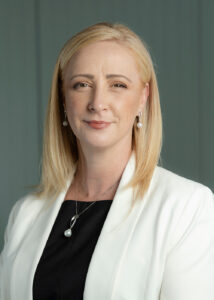
Last week marked the formal opening and first sitting week of the 47th Parliament following the May 2022 General Election. There are many new faces that makeup this new Parliament with 35 newly elected Members of Parliament (out of a total of 151) and 11 new Senators (out of the 40 Senate seats that were up for election this year). Peak and advocacy groups are vying for meetings with the MPs and Senators (ourselves included) keen to brief both new and seasoned parliamentarians. And of course, the change of Government leadership with the ALP now in charge means that there are Ministerial and staffing changes aplenty.
It is, as I have noted previously, abundantly clear that the ALP has come into power with clearly set priorities and agendas. These continue to be the focus of the ALP’s work. The Parliamentary Budget Office produces a report on all election commitments after each election and is well worth a read with the policies underpinning ALP’s commitments available on the Party’s website.
It has been heartening to see the new Federal Government take decisive action on its election commitments – not least the commitment to “implement the Uluru Statement in full – Voice, Treaty and Truth”. Prime Minister Albanese’s powerful speech at the Garma festival last week spoke clearly to the Government’s intention to hold a referendum to constitutionally enshrine a Voice to Parliament.
Along with the commitment to bring a Voice to Parliament, Labor has also committed to ensuring sustained progress on the current National Agreement on Closing the Gap. What helping to truly close the gap looks like for the family and relationship services sector is a work in progress and we too are engaging in some significant conversations to understand what our role in this process can and will be.
Thursday 4 August is National Aboriginal and Torres Strait Islander Children’s Day – ‘My Dreaming, My Future’. This Children’s Day, children are being asked what Dreaming means to them, and what their aspirations are for the future. In the words of the Children’s Day organisers:
“Aboriginal and Torres Strait Islander children are born into stories of their family, culture, and Country. They carry with them the songlines of their ancestors and culture, passed down by generations. Their Dreaming is part of our history, while their futures are their own to shape.”
This week is National Homelessness week, which aims to raise awareness of the impact of homelessness on Australia via national and local community events. Homelessness and housing insecurity has been exacerbated by flooding and bushfires over the past few years, as well as the rapid rise in house prices. There simply isn’t a sufficient affordable housing supply and housing insecurity is a major stressor on families – including seeing more and more separated couples having to live under the same roof. Whilst it is good to see the issues of housing/homelessness addressed in the National Plan for Reducing Violence against Women and Children, there is only fleeting reference to the risk that insecure housing presents for children and young people in the National Framework for Protecting Australia’s children – ‘Safe and Supported’.
In an opinion piece published today, Minister for Housing and Homelessness, Julie Collins, reminded readers that at the centre of the new Albanese Government’s housing reform agenda is a commitment to introduce a National Housing and Homelessness Plan. I certainly hope that the connections between safe, secure housing and ‘safe and supported children’ is explicitly captured in this new plan.
Kind regards,
Jackie Brady
FRSA Executive Director
Wealth inequality and the housing crisis report
The ACOSS/UNSW Sydney Poverty and Inequality Partnership has released its latest report, The wealth inequality pandemic: COVID and wealth inequality. The report tells the story of how wealth inequality in Australia has changed over the pandemic. It reveals that household wealth in Australia has grown over the past 3 years as much as in the previous 15 years, but that this is primarily due to inflated house prices. This has resulted in younger people and those with low incomes being locked out of home ownership.
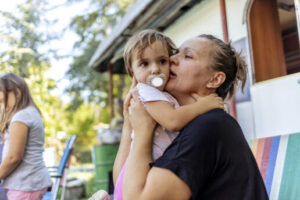
Additionally, the report indicates that rising house prices have widened the gap between renters and home owners. Rents have grown at the fastest rate for 14 years as a result of housing investors seeking to recoup the costs of rising interest rates and higher inflation.
Key Findings
- Households in Australia are on average the fourth richest in the world, but many are financially vulnerable due to high debt or low financial buffers.
- Two thirds of the increase in wealth came from house price inflation. Residential property values rose 22% through the year to December 2021 – the highest annual increase in 35 years.
- Wealth inequality rose sharply from 2003 to 2018, then declined slightly in the pandemic. Rising house prices moderated overall wealth inequality, as housing is distributed more evenly across the population than other kinds of wealth).
- Household wealth is still shared very unequally: The richest 10% of households has an average of $6.1 million and almost half of all wealth (46%), while the lower 60% (with an average of $376,000) has just 17% of all wealth.
Federal meetings on women’s safety
Two meetings were held in July to discuss issues impacting women and women’s safety, with the second meeting dedicated to First Nations women’s safety.
Meeting of federal, state and territory ministers responsible for women and women’s safety
On 22 July, federal, state and territory ministers responsible for women met in Adelaide to discuss a range of important matters for Australian women, with a focus on gender equality, women’s economic security and women’s safety.
Ministers also discussed the National Plan to End Violence against Women and Children 2022-2032 and a standalone National Plan for First Nations women and agreed on a pathway to finalise the Plan.
It is expected that the final version will be released in October.
Federal meeting on First Nations women’s safety
On 28 July, Federal Ministers met with the Aboriginal and Torres Strait Islander Advisory Council on family, domestic and sexual violence to discuss the Albanese Labor Government’s commitment to ending violence against Aboriginal and Torres Strait Islander women and children.
The meeting discussed the work of the Advisory Council in leading the development of the Aboriginal and Torres Strait Islander Action Plan as part of the National Plan to End Violence Against Women and Children 2022-32.
Minister for Social Services Amanda Rishworth said the Government is forging a collaborative partnership with First Nations peoples to effectively address the unacceptable rates of family and domestic violence experienced by First Nations Australians.
Children who have experienced domestic and family violence five times more likely to use mental health service by 18
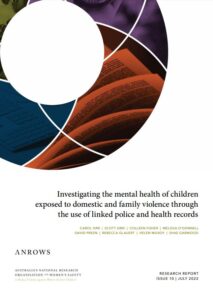 A recent ANROWS report has found that children exposed to domestic and family violence (DFV) are five times more likely to use a mental health service by the time they turn 18 and are experiencing, on average, a six-year delay in receiving mental health support.
A recent ANROWS report has found that children exposed to domestic and family violence (DFV) are five times more likely to use a mental health service by the time they turn 18 and are experiencing, on average, a six-year delay in receiving mental health support.
This retrospective cohort study used police and health records to identify children exposed to DFV in Western Australia. The mental health outcomes for children who had been exposed to DFV were then compared with a group of children who had no known record of DFV.
The study revealed that children who had been exposed to DFV were almost five times more likely to have contact with a mental health service by the time they turned 18 than children with no known experience of violence (79% compared to 16%). It also found children who had been exposed to DFV were more likely to be diagnosed with a range of mental health issues, including a twofold risk in substance use disorder.
ABS figures show rise in police recorded sexual assaults
Figures released by the Australian Bureau of Statistics (ABS) 0n 29 July show that the number of police recorded victims of sexual assault increased by 13 per cent in 2021, the tenth annual rise in a row.
Key statistics:
- Almost two-thirds (61 per cent) of victim-survivors were under the age of 18 when the sexual assault occurred.
- There were six times more female victim-survivors of sexual assault (26,669) than male victim-survivors (4,350).
- Over a third (37 per cent) of sexual assaults were recorded as family and domestic violence-related (11,367 victim-survivors).
- Sexual assaults mostly occurred at residential locations (67%).
The figures are part of National statistics about victims of a range of personal, household and family and domestic violence offences as recorded by police. For more information.
HIPPY gets continued Commonwealth funding
Earlier this month Minister for Social Services Amanda Rishworth announced that the Home Interaction Program for Parents and Youngsters (HIPPY) will receive an investment of $30 million per year over the next five years to enable the program to continue and to undertake program reforms.

For the first time, the government will look to improve the service delivery experience for First Nations communities by exploring how HIPPY can be further delivered in language. The focus of HIPPY will also be shifted to children aged three and four (from ages four and five) for better program outcomes.
ABS National Study of Mental Health and Wellbeing
The Australian Bureau of Statistics (ABS) National Study of Mental Health and Wellbeing, released on 22 July, shows that more than two in five (43.7 per cent) Australians aged 16-85 years have experienced a mental disorder in their lifetime.
The study further found that:
- one in five (21.4% or 4.2 million people) had a 12-month mental disorder
- anxiety was the most common group of 12-month mental disorders (16.8% or 3.3 million people)
- almost two in five people (39.6%) aged 16-24 years had a 12-month mental disorder.
As well as providing an overview of mental health disorders in 2020-21, the study also looks at the actions people took to manage their mental health.
The ABS will publish results from the second cohort (2021-22) of the Study in 2023, as well as results from a combined sample.

Consultation on remake of ACNC Regulations
The Treasury is running a consultation on the remake of the Australian Charities and Not‑for‑profits Commission (ACNC) Regulations.
The existing Australian Charities and Not‑for‑profits Commission Regulation 2013, which outline the requirements of the Australian Charities and Not‑for‑profits Register, the governance standards and external conduct standards applying to charities registered with the Australian Charities and Not‑for‑profits Commission and requirements for registered charities’ annual financial reports, are scheduled to automatically sunset on 1 April 2023.
The draft Australian Charities and Not‑for‑profits Commission Regulations 2022 propose to remake the Regulations, with minimal changes to the substantive requirements and inclusions.
However, a 2018 ACNC Legislative Review found that Governance Standard 3 of the Regulations “is not appropriate” given that registered entities already have to comply with all applicable laws, and the Review recommended it be repealed. A number of Charities consider that the remaking of the Regulations is the perfect time to act on this this recommendation given it was not acted on earlier.
The draft Regulations and the Explanatory Statement are available on the Treasury website.
Submissions to this consultation close on 15 August 2022.
Draft Bill on Criminalising Coercive Control in NSW released for public comment
The NSW Government has released a draft Bill on criminalising coercive control for public comment ahead of its introduction to Parliament.
NSW Attorney General, Mark Speakman, said the consultation on a public exposure draft bill to outlaw coercive control in intimate partner relationships, is part of its ongoing response to the Parliamentary Joint Select Committee on Coercive Control.
Submissions on the Crimes Legislation Amendment (Coercive Control) Bill 2022 can be made via the NSW Government’s ‘Have Your Say’ website.
Consultation closes 31 August 2022.
Release of consultation report on National Plan to end violence against women and children
The Minister for Social Services, the Hon Amanda Rishworth, supported the release of the National Plan Stakeholder Consultation Reports on 14 July 2022.
Consultation activities to inform the development of the draft National Plan to End Violence against Women and Children 2022-2032 (National Plan) included:
- the House of Representatives Standing Committee on Social Policy and Legal Affairs Inquiry into family, domestic and sexual violence
- online public consultation surveys through the DSS Engage platform
- the 2021 National Summit on Women’s Safety.
The Monash Gender and Family Violence Prevention Centre, Monash University, also facilitated targeted consultations, including:
- thematic and jurisdictional workshops
- one-on-one and small group interviews with key stakeholders and other subject matter experts
- and a dedicated consultation with victim-survivor advocates.
The Department of Social Services has published two Stakeholder Consultation Reports developed by Monash University:
- National Plan Stakeholder Consultation Report
- National Plan Victim-Survivor Advocates Consultation Report
You can read more about the National Plan to Reduce Violence against Women and their Children here.

Save the Children Australia’s local services to become known as 54 reasons
 Save the Children Australia has announced a new brand identity for its Australian service delivery division, they will begin operating as, 54 reasons, in response to feedback from local children and communities. The leading global child rights agency created the new name to reflect the unique services it delivers in Australia and the views of Australian children who asked for something of their own, distinct from programs provided around the world.
Save the Children Australia has announced a new brand identity for its Australian service delivery division, they will begin operating as, 54 reasons, in response to feedback from local children and communities. The leading global child rights agency created the new name to reflect the unique services it delivers in Australia and the views of Australian children who asked for something of their own, distinct from programs provided around the world.
54 reasons exists to give a powerful voice to children in Australia, generate systemic change, and provide the high-quality services children need to fulfil their rights. This is represented in the name 54 reasons, which stands for the 54 articles of the UN Convention on the Rights of the Child.
MacKillop Family Services celebrates 25 years
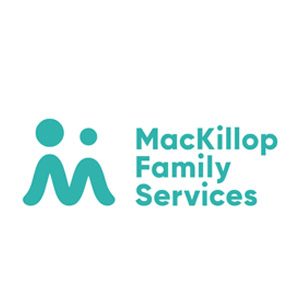 Last month MacKillop Family Services celebrated their 25th anniversary. On 1 July 1997 MacKillop Family Services was formed as a new organisation by re-founding seven agencies operated by the Sisters of Mercy, the Christian Brothers and the Sisters of St Joseph in Victoria.
Last month MacKillop Family Services celebrated their 25th anniversary. On 1 July 1997 MacKillop Family Services was formed as a new organisation by re-founding seven agencies operated by the Sisters of Mercy, the Christian Brothers and the Sisters of St Joseph in Victoria.
Since then MacKillop has grown from a team of 200, delivering residential care, foster care, education, disability and family support across Melbourne and Geelong, to over 1400 employees located in 40 offices in five states and territories.
Congratulations to the MacKillop team on this great milestone! View their interactive timeline.
One in 20 young Australians plunged into first-time homelessness during pandemic
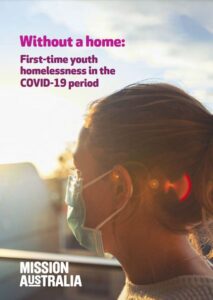 Mission Australia has released their Without a home: First-time youth homelessness in the COVID-19 period report which reveals almost one in 20 young people aged 15 to 19 who responded to Mission Australia’s Youth Survey 2021 were homeless for the first time during the pandemic. This is a significant increase since 2017, when almost one in 25 young people had recently been pushed into first-time homelessness.
Mission Australia has released their Without a home: First-time youth homelessness in the COVID-19 period report which reveals almost one in 20 young people aged 15 to 19 who responded to Mission Australia’s Youth Survey 2021 were homeless for the first time during the pandemic. This is a significant increase since 2017, when almost one in 25 young people had recently been pushed into first-time homelessness.
The new report reveals young Australians who recently faced youth homelessness during COVID-19 experienced high levels of psychological distress, negative impacts on wellbeing, family conflict, discrimination and other pressures.
These young Australians were first-time homeless either with or without their families, and recently spent time without a fixed address, living in a refuge or transitional accommodation, or spent time away from home because they felt they couldn’t go back.
Key findings:
- The report shows young females were twice as likely as young males to have gone without a safe home during the pandemic.
- Almost half (49.3%) of young people who had been homeless for the first time during COVID-19 were personally concerned about family conflict and more than one-quarter (28.0%) were personally concerned about domestic and family violence.
- More than half (55.5%) of young people who had faced first-time homelessness experienced psychological distress. Alarmingly, almost one in three (32.1%) young people who were forced into homelessness during COVID-19 felt very sad/sad, over a third (35.8%) rated their mental health and wellbeing as poor, and a quarter (25.0%) felt negatively about the future.
- More than half (55.6%) of young people who had been recently first-time homeless stated they experienced unfair treatment or discrimination, mostly due to mental health, gender or sexuality.
- Close to half (45.4%) of these young people said COVID-19 had negatively impacted their friendships, and two in five (40.8%) said their employment had been impacted.

Relationships Australia NT CEO resigns
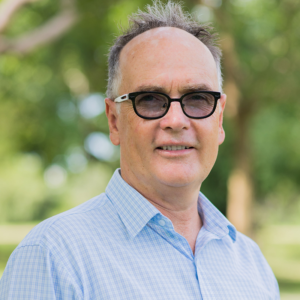
Relationships Australia NT CEO Michael Meegan has resigned from the organisation to return to Western Australia. FRSA wishes Michael all the best for the future.
Relationships Australia WA farewells CEO Terri Reilly
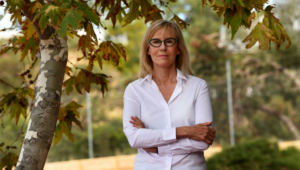
Last month Relationships Australia WA said goodbye to CEO, Terri Reilly. Terri is retiring after leading the organisation for nearly 20 years.
“Terri has been an exceptional leader initiating substantial change and consolidation of the organisation’s position as a leader in services supporting families, couples and individuals of all ages and cultural backgrounds in metropolitan, rural and regional areas across WA,” said Relationships Australia WA President, Chris Lewis.
FRSA wishes Terri well in her retirement.

First Nations Family Dispute Resolution
The First Nations Family Dispute Resolution grant opportunity is being provided by the Attorney-General’s Department.
This grant opportunity is for the provision of funding to Aboriginal Community Controlled Organisations (ACCOs) to deliver culturally safe and appropriate family dispute resolution for Aboriginal and Torres Strait Islander families, and other families as determined appropriate by the successful grant applicants.
Services delivered under this program must be child-focused and should have an emphasis on early intervention and prevention.
The objectives of the grant opportunity are to:
- support Aboriginal and/or Torres Strait Islander families in a culturally safe setting to negotiate outcomes in the best interest of children, resolve separation and divorce issues, and improve their post-separation relationships
- align with Priority Area 2 of the National Agreement on Closing the Gap by building formal Aboriginal and Torres Strait Islander community-controlled sectors to deliver services to support Closing the Gap.
To be eligible you must be one of the following entity types:
- Company
- Cooperative
- Corporate State or Territory Entity
- Indigenous Corporation
- Incorporated Association
- Local Government Entity
- Statutory Entity.
Applications are now open and close 9:00 pm AEST on Thursday 18 August 2022. Find out more on GrantConnect.
Carer leave, Issues paper release and call for submissions
The Productivity Commission has been asked to examine the economic and social costs and benefits of providing an extended unpaid leave entitlement to informal carers of older Australians under the National Employment Standards. The Productivity Commission has released an issues paper to guide people in preparing a submission.
Initial submissions are due by by Friday 26 August 2022. Make a submission or download the issue paper here.
New grant opportunities open!
The Commonwealth Government has announced that two new grant rounds will soon open:
Support for children with disability or developmental concerns
This grant will aim to increase children’s readiness for educational environments, and provide opportunities for children to socialise with peers and their siblings in a supported environment.
Examples of activities expected under the grant include, but are not limited to:
- supported playgroups
- facilitated group stories and imaginative play times
- facilitated group art and music programs.
Find out more on GrantConnect.
Support and connection for parents and carers of young children with disability or developmental concerns
This grant will aim to build parents capacity to support their child’s development through facilitated group information sessions or workshops. This will give families the opportunity to learn from and connect with evidence-based information, family-focused strategies and peers with similar experiences.
Funding of up to $6.9 million over 3 years is available for each of these grants.
It is preferable each grant will fund one provider or consortia to deliver activities across Australia. Applicants may apply for one or both grants.
These open competitive grants will open in early August 2022 for 4 weeks.
Find out more on GrantConnect.
Applications for both funding rounds close 5:00 pm AEST on Friday 26 August 2022.
Nominations Open for Human Rights Awards
 Nominations are now open for the 2022 Human Rights Awards. The categories for this year’s awards are:
Nominations are now open for the 2022 Human Rights Awards. The categories for this year’s awards are:
- Human Rights Medal
- Young People’s Human Rights Medal
- Community Award
- Law Award
If you know a person, group, organisation or community that has contributed to human rights in these categories during in 2021-22. Complete the nomination form here. Submissions close Sunday 4th September.
Effective Online Group Leadership Workshop
SUNSHINE CIRCLES – Albury
SUNSHINE CIRCLES – Shepparton
HEY LITTLE WARRIOR – Sale
NT
Family Dispute Resolution Practitioner | Relationships Australia NT
Manager Counselling – Family and Relationship Services | Relationships Australia NT
VIC
Family Relationship Counsellor – Child Practitioner | Relationship Matters
NSW
Counsellor | CatholicCare Diocese of Broken Bay
Specialist Lead – Intensive Family Preservation | CatholicCare Diocese of Broken Bay
If you have any events you’d like listed on the FRSA Events and Training Calendar or job vacancies you’d like listed on the FRSA Jobs Board, email Communications Officer, Vanessa Lam at communications@frsa.org.au. Please note that posting onto the FRSA website is reserved for FRSA Members only.

Supporting women’s financial safety | Department of the Prime Minister and Cabinet
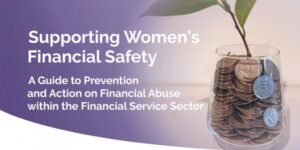 This guide provides user-friendly checklists for financial service organisations to better understand, prevent and address financial abuse.
This guide provides user-friendly checklists for financial service organisations to better understand, prevent and address financial abuse.
Grandparents and child care in Australia | Australian Institute of Family Studies
Report focuses on child care provided by grandparents, their experiences and challenges around it, including the impact of COVID-19. It’s based on data from the third Families in Australia Survey.
“Care that is right for me”: A resource for working with aged care consumers | Aged Care Quality and Safety Commission
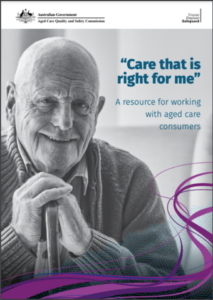 This resource identifies a range of best practice strategies and tools to support aged care providers to improve their engagement with aged care consumers and their representatives.
This resource identifies a range of best practice strategies and tools to support aged care providers to improve their engagement with aged care consumers and their representatives.
Accessing LSAC data | The Longitudinal Study of Australia Children
The 9.0C2 of LSAC is now available. The following types of datasets are available:
- Main data: Includes the main datasets for each wave and cohort; household data; time use diary data; event history calendar data; executive functioning data.
- In-between wave data: Includes data collected between waves (Wave 2.5 and Wave 3.5)
- Linked data: Includes linked data for Medicare Australia, NAPLAN, MySchool, AEDC, and Centrelink
- Child Health CheckPoint data: Includes data from a sub-study of LSAC, Growing Up in Australia’s Child Health CheckPoint
Working with children who have experienced trauma | Emerging Minds
Emerging Minds has developed a suite of free online courses and resources to assist different practitioners – from students and volunteers through to specialist practitioners – to understand and support children and families who have experienced trauma.
ldentifying strategies to better support foster, kinship and permanent carers: Final report | Australian Institute of Family Studies
AIFS worked with Murawin, an Aboriginal research and evaluation consultancy, on research to find out how to better support foster, kinship and permanent carers. The government wanted to know what carers needed so they can attract more carers and keep them for longer.
Mental health and wellbeing during the COVID-19 period in Australia | Centre for Social Research and Methods (ANU)
More than two years since the first cases in Australia, now is an opportune time to assess medium-term impacts of the COVID-19 pandemic on mental health and wellbeing. This paper provides data on the mental health and wellbeing of Australians during the first two-years of the pandemic, how these varied for key population groups, and for which group mental health and wellbeing has not recovered to pre-COVID levels.
Understanding economic and financial abuse and older people in the context of domestic and family violence | Gendered Violence Research Network
This research paper analyses existing research on older people, economic and financial abuse. It identifies a gap in the evidence base relating to the perpetration of economic and financial abuse against older people specifically in the context of domestic and family violence.
Protect the protest! Why we must save our right to protest | Amnesty International
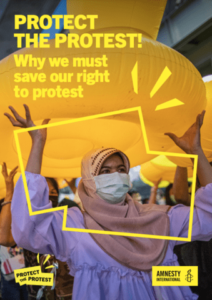 Amnesty International is launching a global campaign called Protect the protest, which will challenge global and widespread attacks on peaceful protest, stand with peaceful protesters, and support the causes of social movements pushing for human rights. Their goal is for all people to be able to take peaceful action and make their voice heard safely and without repercussions
Amnesty International is launching a global campaign called Protect the protest, which will challenge global and widespread attacks on peaceful protest, stand with peaceful protesters, and support the causes of social movements pushing for human rights. Their goal is for all people to be able to take peaceful action and make their voice heard safely and without repercussions
E-change and remote work in Australia | Australian Communications Consumer Action Network
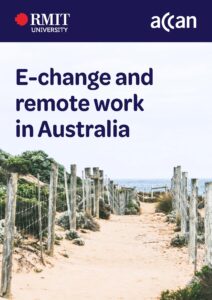 The COVID-19 pandemic continues to present opportunities for examining the work-life relationship. This report focuses on those who relocate due to increased access to remote work technologies and flexible arrangements. The investigation includes findings on the economic and social impacts of remote work from rural and regional areas in Australia.
The COVID-19 pandemic continues to present opportunities for examining the work-life relationship. This report focuses on those who relocate due to increased access to remote work technologies and flexible arrangements. The investigation includes findings on the economic and social impacts of remote work from rural and regional areas in Australia.
Better practice responses to victim survivors of family violence | Safe and Equal
This project aims to provide evidence-based guidance about how the Essential Services Commission and essential providers engage with the customer vulnerability of victim survivors of family violence.
Want to submit something to the FRSA eBulletin?
If you have an news item or event that you would like to be featured in a future eBulletin please submit your announcement via the form below or email communications@frsa.org.au with the subject “FRSA eBulletin submission”.
Please note FRSA members receive priority for items posted in the eBulletin. And to keep information current, relevant and useful, submissions will not be repeated from week to week.
Subscribe
Subscribe to receive future eBulletin editions directly to your inbox!






